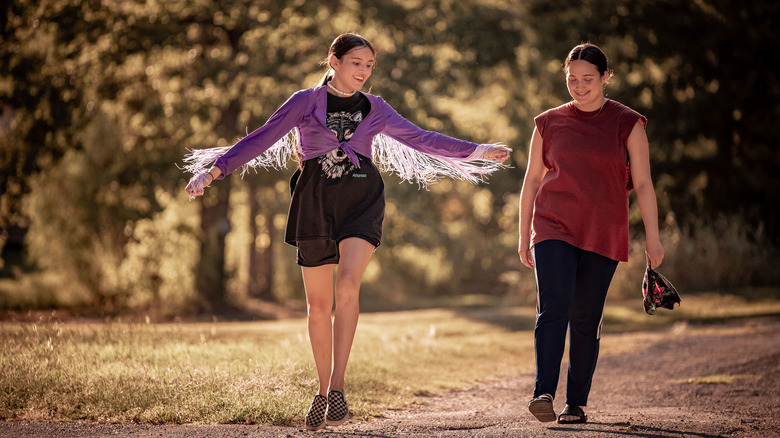Fancy Dance Review: A Post-Colonial Tale Of Community, Love, & Perseverance [Sundance]
Native Americans. Indigenous. First Nations. Indians. There are many names we grapple with when discussing the communities across North America that predate colonizers. Indian Country — the general term for the hundreds of self-governing tribal nations — is a broad, vast community of people who refuse to be erased, yet it remains underrepresented in mainstream media. "Fancy Dance" is here to challenge that.
The film is written and directed by Erica Tremblay, an award-winning writer and director from the Seneca-Cayuga Nation. It stars the award-winning actress Lily Gladstone (who's been cast as a lead in Martin Scorsese's feature film "Killers of the Flower Moon") and the up-and-coming Isabel Deroy-Olson. Gladstone portrays the tough-as-nails Jax, who's been thrust into a caretaker role for her niece Roki (Deroy-Olson) following the disappearance of Tawi, Jax's sister and Roki's mother. Life is not easy for these women on the rez — they live in poverty, getting by through scrappy means — but the love they have for each other and their community runs deep. Unfortunately, even this tenuous comfort is disrupted when child protective services arrives and threatens to take Roki off the Reserve.
"Fancy Dance" is framed around an upcoming powwow (hence the title): Roki attends this cultural event every year and performs a ceremonial mother-daughter dance with Tawi. Despite her mother having been missing for weeks, Roki — somewhat naïvely — believes that Tawi will be there and that they'll reconnect. She even sews her mother new regalia for the dance. For the viewer, however, we know the truth: The number of missing and murdered Indigenous women grows every year. The outlook for Roki's mother does not look good.
A brutally honest look at lingering colonialism
"Fancy Dance" has excellent performances, elevated by the script's deft composition. There's a remarkable nuance at play in this story of womanhood, parenthood, sexuality, community, and coming of age. It all feels so real and authentic. Jax is not your conventional lead: She's a soft butch, unabashedly visiting the local strip club and exuding gentle confidence — even when face-to-face with men threatening to do violence. (She also shares my body type and general vibe, which was a treat for me.) Gladstone is unforgettable as Jax; she feels like a real person, not the kind of glamorized or exaggerated archetype that is typical for a movie's lead. The script is very tight: character motivation is clear, story beats flow into each other in believable and compelling ways, and nothing ever feels forced or contrived. There's a hint of spirituality at play in the narrative, but it's subtle — honoring Iroquois sacred traditions without falling into magical/noble savage territory.
The sensitive matter in "Fancy Dance" is handled with remarkable precision and brutal honesty. It's difficult to portray contemporary racism in film in a manner that is believable but also recognizable. By that I mean, films tend to either downplay racism by having it come across as benign and isolated, or they exaggerate the racism to the point of being unrealistically aggressive and cartoonish. Both forms actually discourage viewers from recognizing themselves in the offending characters, so it inadvertently perpetuates misconceptions about race relations, allowing micro-aggressions and problematic ideas to proliferate.
Institutionalized racism reverberates throughout "Fancy Dance" and it's impossible to ignore. Tawi's disappearance is not being investigated seriously because she's from the Seneca-Cayuga Reservation (and presumably also because of her lifestyle — she's a stripper and is connected to criminal activity). What's worse, more resources are put into investigating whether Jax is fit to be a parental guardian for Roki. The film shows the insidious nature of colonization, and how even in 2023, there are nice, well-meaning white ladies who will rip away a young girl from her culture and not even realize they're doing a bad thing. In one particularly harrowing scene, Roki's white step-grandmother tries to gift her old ballet shoes to Roki, telling the teen girl that she can't go to the powwow, but she can replace that part of her life with the more acceptable, distinctly-not-indigenous ballet lessons (the whitest of all the dances). When Roki tries to explain it's not about the dance, it's about the connection to her people, her pleas fall on deaf ears. For all their concerns, the white people interfering in Roki's life after the traumatic disappearance of her mother are actively doing the young girl more harm.
"Fancy Dance" is an empowering feature film that celebrates femininity in all its forms, while also being a loving tribute to contemporary Native American culture. It's a strong project from an already accomplished writer and director, and a must-see film from Sundance 2023.
/Film rating: 9 out of 10

